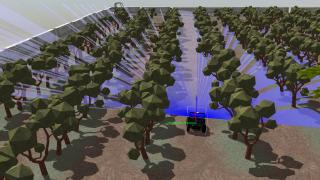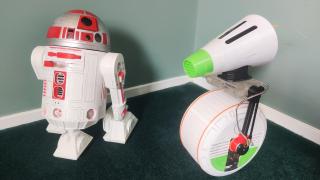
External Awards Received
The Office of Research would like to congratulate the following recipients on receiving external funding:
Dr. Yunus Zeytuncu, Associate Professor of Mathematics, was awarded a grant of $59,578 from the National Security Agency for his project “REU Site: Mathematical Analysis and Applications” which will support his Research Experiences for Undergraduates (REU) program and contribute to the mathematical infrastructure by training the upcoming generation of researchers.
Dr. Abdallah Chehade, Assistant Professor of Industrial and Manufacturing Systems Engineering, received $199,012 from Ford Motor Company for his project “Generating Crash/Near-Crash Driving Simulations to Achieve the SOTIF of Automated Driving Technologies.” The goal of this project is to develop driving simulations for rare and unknown events that are not observed on collected road data, in order to achieve the Safety of Intended Functionality (SOTIF) for developed Automated Driving technologies.
Dr. John Cristiano, Assistant Dean for Research Development and Strategic Initiatives in CECS, received $160,000 from Ford Motor Company for the “2021 Summer Sabbatical Program.” This program will pair CECS junior faculty with researchers at Ford. While embedded at Ford, faculty have the opportunity to network and learn about industry challenges and problems, while the collaborators at Ford become aware of the faculty research expertise. This year’s participating faculty are: Georges Ayoub, Hugo Casquero, Lei Chen, Junho Hong, and Zhen Hu.
Announcements
The Office of Research is pleased to welcome our newest staff member: Rebecca Wren!
Rebecca joined our team on Monday, May 17, filling our vacant Project Coordinator position. Rebecca will support the work of our office by coordinating project logistics and programmatic components associated with Research Development efforts. She will also provide assistance with various administrative tasks related to our Pre-Award Services and general office operations.
Rebecca comes to us from the U-M Office of New Student Programs in Ann Arbor, where she served as the Administrative Services Coordinator. She also previously worked in the Ann Arbor campus' Office of the Registrar. Rebecca holds a bachelor's degree from the University of Michigan in Sociology with a minor in Applied Statistics.
Please join us in welcoming Rebecca to the UM-Dearborn community!
The Office of Research invites you to a webinar dedicated to the NIH Academic Research Enhancement Awards (AREA) program:
Please join us on June 7, 11 a.m. -Noon for an interactive training on how to proactively plan proposal submissions to the NIH R15 AREA/REAP program.
Note: If you register for the webinar but are unable to attend, you will still receive a link to the recording.
Faculty Early Career Development Program (CAREER) Discussions
Join the group discussions on Fridays, 12pm-1pm for hints on how to improve your proposal and for the opportunity to ask program-related questions to the Office of Research staff members and to discuss your ideas with peers. Meeting dates: May 28, June 4, and June 11
To receive an invitation, email: [email protected]
Use subject line: Join NSF CAREER discussion
Reminders
June 30 deadline for all researchers to complete expanded training course
Faculty, employees and students engaged in research and scholarship across all three U-M campuses are required, by June 30, to complete an expanded training course that outlines important guidance about responsible conduct in research and scholarship. The updated PEERRS Responsible Conduct of Research and Scholarship training course, which is designed to include expanded federal requirements, is available through MyLINC. Researchers will be ineligible to receive external funding if they do not complete this required training course by June 30.
Learn more about RCRS training, and if you have any further questions, please contact [email protected].
Free Proposal Review and Copy Edit Services for UM-Dearborn Faculty
Through our continued partnership with McAlister & Quinn (M&Q), a grants and government relations company, the Office of Research provides free of charge the following services to UM-Dearborn faculty:
Proposal Review
A McAllister and Quinn reviewer will provide feedback on the content of the application with specific emphasis on the alignment with the funding opportunity and agency priorities. The feedback will identify strengths, weaknesses and areas for clarification.
Copy Edit
A McAllister and Quinn editor will do a final review of the documents to ensure there are no typos or errors and looks ready for submission. The editor does not review the content or science of the documents. The edit should take place near the end of the writing process. The service is available for research & planning proposals, journal articles, book chapters, etc.
More information and to request an M&Q service.
Questions? Email: [email protected]
Updates
IRB Health Sciences & Behavioral Sciences Education
The IRB-HSBS education program offers several remote learning opportunities for faculty, staff, and students from the Ann Arbor, Dearborn, and Flint campuses. Please contact the IRB-HSBS office at 734-936-0933 or [email protected] to learn more. Researchers who prefer to discuss their specific projects, ask questions, and get help on an individual basis may schedule a video conference with IRB staff.
Upcoming Funding Opportunities
Please contact the UM-Dearborn Office of Research if you would like more information about submitting a proposal to any of the following programs.
| Funding Entity | Program Title & Links | Description | Deadline |
|---|---|---|---|
| DHS | CISA Cyber Security Awareness Campaign | The purpose of this grant is to fund National Cybersecurity Awareness activities to benefit the American people by providing support to States, local governments, non-profit organizations, and critical infrastructure for programs intended to build the cybersecurity knowledge of our Nation to ensure every American has the resources they need to stay safer and more secure online. It is not SED’s intent to award this grant to a private entity critical infrastructure, but rather to a qualified nonprofit organization. | June 18, 2021 |
| NSF | Engineering Research Initiation (ERI) | The National Science Foundation (NSF) Directorate for Engineering (ENG) seeks to build engineering research capacity across the nation by investing in new academic investigators who have yet to receive research funding from Federal Agencies. The Engineering Research Initiation (ERI) program aims to support new investigators as they initiate their research programs and advance in their careers as researchers, educators, and innovators. | June 18, 2021 |
| NIH | Academic Research Enhancement Award for Undergraduate-Focused Institutions | The National Institutes of Health (NIH) is continuing to make a special effort to stimulate research at educational institutions that provide baccalaureate and/or advanced degrees for a significant number of the Nation's research scientists, but that have not been major recipients of NIH support. This funding opportunity announcement aims to support AREA grants to undergraduate-focused institutions that do not receive substantial funding from the NIH, in order to provide biomedical research experiences for undergraduate students and enhance the research environment at these institutions. AREA funds are intended to support new and renewal biomedical research projects proposed by faculty members of eligible institutions. | June 25, 2021 October 25, 2021 |
| NIH | Academic Research Enhancement Award for Undergraduate-Focused Institutions (R15 Clinical Trial Not Allowed) | The National Institutes of Health (NIH) is continuing to make a special effort to stimulate research at educational institutions that provide baccalaureate and/or advanced degrees for a significant number of the Nation's research scientists, but that have not been major recipients of NIH support. This funding opportunity announcement aims to support AREA grants to undergraduate-focused institutions that do not receive substantial funding from the NIH, in order to provide biomedical research experiences for undergraduate students and enhance the research environment at these institutions. AREA funds are intended to support new and renewal biomedical research projects proposed by faculty members of eligible institutions | June 25, 2021 October 25, 2021 |
| NSF | Racial Equity in STEM Education | The National Science Foundation (NSF) Directorate for Education and Human Resources (EHR) seeks to support bold, ground-breaking, and potentially transformative projects addressing systemic racism in STEM. Proposals should advance racial equity in science, technology, engineering, and mathematics (STEM) education and workforce development through research (both fundamental and applied) and practice. Core to this funding opportunity is that proposals are led by, or developed and led in authentic partnership with, individuals and communities most impacted by the inequities caused by systemic racism. | July 13, 2021 October 12, 2021 |
| NSF | Engineering Research Initiation | The Engineering Research Initiation (ERI) program aims to support new investigators as they initiate their research programs and advance in their careers as researchers, educators, and innovators. This funding opportunity also aims to broaden the base of investigators involved in engineering research and therefore is limited to investigators that are not affiliated with “very high research activity” R1 institutions (according to the Carnegie Classification https://carnegieclassifications.iu.edu/). | July 18, 2021 |
| NSF | Faculty Early Career Development Program (CAREER) | The Faculty Early Career Development (CAREER) Program is a Foundation-wide activity that offers the National Science Foundation's most prestigious awards in support of early-career faculty who have the potential to serve as academic role models in research and education and to lead advances in the mission of their department or organization. Activities pursued by early-career faculty should build a firm foundation for a lifetime of leadership in integrating education and research | July 26, 2021
Fourth Monday in July, Annually Thereafter
|
| NSF | ADVANCE: Organizational Change for Gender Equity in STEM Academic Professions | The NSF ADVANCE program contributes to the National Science Foundation's goal of a more diverse and capable science and engineering workforce.1 In this solicitation, the NSF ADVANCE program seeks to build on prior NSF ADVANCE work and other research and literature concerning gender, racial, and ethnic equity. The NSF ADVANCE program goal is to broaden the implementation of evidence-based systemic change strategies that promote equity for STEM2 faculty in academic workplaces and the academic profession. The NSF ADVANCE program provides grants to enhance the systemic factors that support equity and inclusion and to mitigate the systemic factors that create inequities in the academic profession and workplaces. Systemic (or organizational) inequities may exist in areas such as policy and practice as well as in organizational culture and climate. For example, practices in academic departments that result in the inequitable allocation of service or teaching assignments may impede research productivity, delay advancement, and create a culture of differential treatment and rewards. Similarly, policies and procedures that do not mitigate implicit bias in hiring, tenure, and promotion decisions could lead to women and racial and ethnic minorities being evaluated less favorably, perpetuating historical under-participation in STEM academic careers and contributing to an academic climate that is not inclusive | August 6, 2021 |
| NSF | Economics | The Economics program supports research designed to improve the understanding of the processes and institutions of the U.S. economy and of the world system of which it is a part. This program also strengthens both empirical and theoretical economic analysis as well as the methods for rigorous research on economic behavior. It supports research in almost every area of economics, including econometrics, economic history, environmental economics, finance, industrial organization, international economics, labor economics, macroeconomics, mathematical economics, and public finance. | August 18, 2021 |
| NSF | Decision, Risk and Management Sciences (DRMS) | The Decision, Risk and Management Sciences program supports scientific research directed at increasing the understanding and effectiveness of decision making by individuals, groups, organizations, and society. Disciplinary and interdisciplinary research, doctoral dissertation research improvement grants (DDRIGs), and conferences are funded in the areas of judgment and decision making; decision analysis and decision aids; risk analysis, perception, and communication; societal and public policy decision making; management science and organizational design. The program also supports small grants that are time-critical (Rapid Response Research - RAPID) and small grants that are high-risk and of a potentially transformative nature (Early-Concept Grants for Exploratory Research - EAGER). | August 18, 2021 |
| NIH | NIH Director’s New Innovator Award Program (DP2 Clinical Trial Option) | The NIH Director's New Innovator Award addresses two important goals: stimulating highly innovative research and supporting promising Early Stage Investigators. Early Stage Investigators may have exceptionally innovative research ideas, but not the preliminary data required to fare well in the traditional NIH peer review system. As part of NIH's commitment to increasing opportunities for Early Stage Investigators, it has created the NIH Director's New Innovator Award to support outstandingly creative Early Stage Investigators who propose highly innovative research projects with the potential for unusually high impact. It is designed specifically to support unusually creative investigators with highly innovative research ideas at an early stage of their career when they may lack the preliminary data required for a conventional R01 grant application. | August 20, 2021 |
| NSF | National Science Foundation Research Traineeship (NRT) Program | The NSF Research Traineeship (NRT) program seeks proposals that explore ways for graduate students in research-based master’s and doctoral degree programs to develop the skills, knowledge, and competencies needed to pursue a range of STEM careers. The program is dedicated to effective training of STEM graduate students in high priority interdisciplinary or convergent research areas, through a comprehensive traineeship model that is innovative, evidence-based, and aligned with changing workforce and research needs. Proposals are requested that address any interdisciplinary or convergent research theme of national priority, as noted above. | Sept. 6, 2021 ! Limited Sub-missions Opport-unity! |
| NSF - NIH | Smart Health and Biomedical Research in the Era of Artificial Intelligence and Advanced Data Science (SCH) | The purpose of this interagency program solicitation is to support the development of transformative high-risk, high-reward advances in computer and information science, engineering, mathematics, statistics, behavioral and/or cognitive research to address pressing questions in the biomedical and public health communities. Transformations hinge on scientific and engineering innovations by interdisciplinary teams that develop novel methods to intuitively and intelligently collect, sense, connect, analyze and interpret data from individuals, devices and systems to enable discovery and optimize health. Solutions to these complex biomedical or public health problems demand the formation of interdisciplinary teams that are ready to address these issues, while advancing fundamental science and engineering. | Nov.10, 2021 |
| NSF | Broadening Participation in Computing (BPC) | The Broadening Participation in Computing program (BPC) aims to significantly increase the number of U.S. citizens and permanent residents receiving post-secondary degrees in the computing disciplines, and to encourage participation of other underrepresented groups in the discipline. These groups may include women, persons with disabilities, Blacks and African Americans, Hispanics, American Indians, Alaska Natives, Native Hawaiians, and Pacific Islanders. With this solicitation, the BPC program seeks to engage the computing community to develop and implement innovative methods, frameworks, and strategies to improve recruitment and retention of these students through undergraduate and graduate degrees. Projects that target stages of the academic pipeline through faculty ranks are encouraged. All BPC projects must have the potential for widespread, national impact. That is, they should either develop an effective practice that could be widely deployed, or they should deploy existing effective practices to reach larger audiences. | January 20, 2022 |
| NSF | Innovations in Graduate Education (IGE) Program | The Innovations in Graduate Education (IGE) program is designed to encourage the development and implementation of bold, new, and potentially transformative approaches to STEM graduate education training. The program seeks proposals that explore ways for graduate students in research-based master’s and doctoral degree programs to develop the skills, knowledge, and competencies needed to pursue a range of STEM careers. IGE focuses on projects aimed at piloting, testing, and validating innovative and potentially transformative approaches to graduate education. IGE projects are intended to generate the knowledge required for their customization, implementation, and broader adoption. The program supports testing of novel models or activities with high potential to enrich and extend the knowledge base on effective graduate education approaches. | March 25, 2022 |
| NSF | Broadening Participation in Engineering (BPE) | NSF seeks to strengthen the future U.S. Engineering workforce by enabling the participation of all citizens through the support of research in the science of Broadening Participation in Engineering (BPE). The BPE program is dedicated to supporting the development of a diverse and well-prepared engineering workforce. BPE focuses on enhancing the diversity and inclusion of all underrepresented populations in engineering, including gender identity and expression, race and ethnicity (African Americans/Blacks, Hispanic Americans, American Indians, Alaska Natives, Native Hawaiians, and Native Pacific Islanders), disability, LGBTQ+, first generation college and socio-economic status. BPE research activities will provide scientific evidence that engineering educators, employers, and policy makers need to make informed decisions to design effective programs that broaden the participation of persons from historically underrepresented groups in the engineering workforce. BPE is interested in funding research that spans K-12 to workforce and offers the greatest return on investment. | No Deadline |
| NSF | Smart and Connected Communities | The S&CC program encourages researchers to work with community stakeholders to identify and define challenges they are facing, enabling those challenges to motivate use-inspired research questions. For this solicitation, community stakeholders may include some or all of the following: residents, neighborhood or community groups, nonprofit or philanthropic organizations, businesses, as well as municipal organizations such as libraries, museums, educational institutions, public works departments, and health and social services agencies. The S&CC program supports integrative research that addresses fundamental technological and social science dimensions of smart and connected communities and pilots solutions together with communities. Importantly, the program is interested in projects that consider the sustainability of the research outcomes beyond the life of the project, including the scalability and transferability of the proposed solutions. | Anticipated solicitation in fall 2021 |





